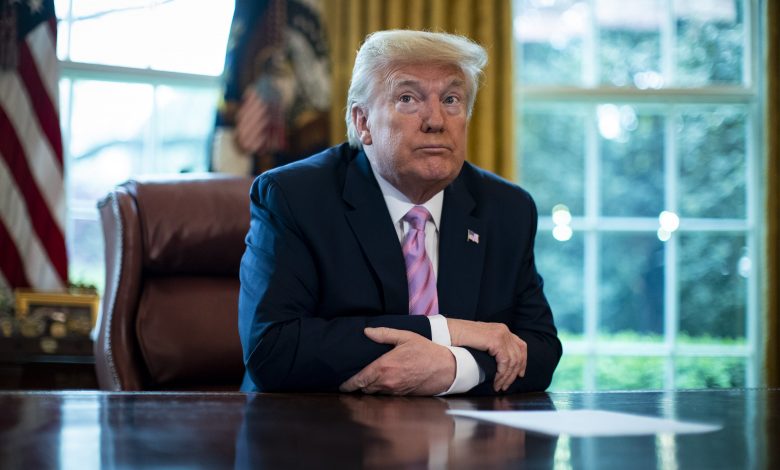OPEC+ cut is Trump’s ‘biggest and most complex’ deal ever: Dan Yergin

[ad_1]
U.S. President Donald Trump pauses while speaking during a Easter blessing event in the Oval Office of the White House in Washington D.C., U.S., on Friday, April 10, 2020.
Al Drago | Bloomberg | Getty Images
As the Organization of the Petroleum Exporting Countries and its allies came to an agreement on a record cut in oil production, U.S. President Donald Trump may have struck his “biggest and most complex deal,” according to oil expert Dan Yergin.
“What was so interesting — among many, very interesting things in this unprecedented event — was the turnaround, the pivot by Donald Trump,” Yergin, who is vice chairman at IHS Markit, told CNBC’s “Street Signs” on Monday.
Just a few weeks ago, Trump had said the early-March plunge in oil prices were “good for the consumer” as it meant lower gasoline prices. That drop in crude prices had been triggered by an oil price war between Saudi Arabia and Russia after Moscow rejected a proposal by OPEC to cut 1.5 million barrels of production per day.
The sharp decline in oil prices spurred giant capex and job cuts across the U.S. shale industry, which has some of the highest production costs in the world.
But Yergin said: “(Trump) came to see this as a national security issue, also an employment issue, and a very important factor in the U.S. economy … and he just jumped in.”
“This must be the biggest and most complex deal (Trump)’s ever made,” Yergin said. “Not only was he a deal maker, but he was also something of a divorce mediator.”
It looked like a mission impossible a few weeks ago.
Dan Yergin
vice chairman, IHS Markit
Yergin said there were two main factors driving the turnaround to the deal that just six weeks ago “would not have seemed possible.”
Firstly, he said, the price of oil was in danger of crashing without a deal as there was limited inventory space left. That would have had “severe repercussions” beyond the oil industry itself and other sectors such as finance.
The other driving factor was likely due to a dearth in oil demand, where the “producers found they couldn’t sell their oil.” Crude demand has taken a hit in recent weeks as measures taken by authorities to stem the spread of the coronavirus pandemic have left major economies effectively frozen.
“I think all those things came together but then it was this dealmaker … Donald Trump who got on the phones,” Yergin said. “I would say it looked like a mission impossible a few weeks ago. Turned out, it was mission possible.”
His comments came after OPEC+ finalized an agreement to cut production by 9.7 million barrels per day — the single largest output cut in history.
OPEC+ is hoping that nations outside of the group, including the U.S., Canada and Norway, will also cut back on production in an effort to shore up prices. For his part, Trump has noted that market forces would naturally curb output stateside, after previously stopping short of saying the U.S. would scale back production.
Deal has averted ‘disaster’
Commenting on the deal that has been struck by OPEC+, Yergin said it has “bought time” and avoided what is known as a “tank top” by the end of April to beginning of May.
He also said it addresses another problem of the build up in inventories that were so high that they would have left pressure on the market over the next few years.
“This agreement goes two years, so it’s also meant to manage the inventories downward over that period of time,” Yergin said. “What this has done is averted what really would have been a disaster for the oil industry and I think it does give some stabilization.”
Still, he acknowledged that the whole problem was not addressed, though the deal “goes a long way” and the alternative was a “pretty steep drop.”
— CNBC’s Pippa Stevens and Natasha Turak contributed to this report.
Source link






